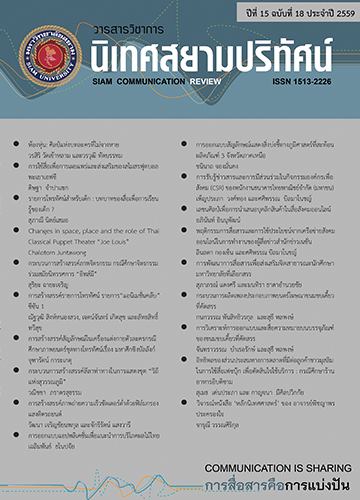รายการโทรทัศน์สำหรับเด็ก : บทบาทของสื่อเพื่อการเรียนรู้ของเด็ก ?
Main Article Content
บทคัดย่อ
การผลิตรายการทีวีให้ตรงกับพัฒนาการเด็กและเด็กสนใจติดตามเป็นงานที่ไม่ง่าย การสะสมความรู้ ประสบการณ์ งานวิจัย ทรัพยากรและการใช้เทคโนโลยีสื่อใหม่ๆ เป็นสิ่งที่สามารถสนับสนุนการผลิตรายการทีวีที่ดี ถึงแม้ว่าจะมีการผลิตรายการทีวีที่มีคุณภาพในมุมมองของผู้ผลิต แต่ก็อาจจะยังไม่ตรงกับความต้องการของผู้ชม ทั้งนี้เนื่องมาจากปัจเจกนิยมของผู้รับข่าวสาร/ผู้ชมแต่ละคนที่ไม่เหมือนกัน ครอบครัวพ่อแม่ ผู้ปกครอง หรือผู้ดูแลที่ใกล้ชิดซึ่งเป็นผู้ที่รู้จักเด็กดีที่สุดมีบทบาทสำคัญในการดูทีวีหรือพูดคุยกับเด็กเพื่อให้ได้รับประโยชน์จากการชมรายการดังกล่าวและหลีกเลี่ยงรายการที่ไม่เหมาะสม ผลงานวิจัยหลายชิ้นชี้ให้เห็นว่า สื่อมีอิทธิพลทั้งในด้านบวกและด้านลบกับเด็ก จึงเป็นความรับผิดชอบของผู้ชมที่เป็นผู้ใหญ่ที่จะเลือกรายการที่มีอยู่อย่างจำกัดที่ไม่เป็นอันตรายกับเด็ก แต่เป็นรายการที่เหมาะสมเพื่อส่งเสริมพัฒนาการทางสติปัญญาแก่เด็ก ผู้ชมที่เป็นผู้ใหญ่ควรติดตาม/ตามให้ทันสารสนเทศที่มีอยู่ท่วมท้นผ่านเครื่องมือสื่อและ ตรวจ/คัดกรองเพื่อการใช้งานได้อย่างเหมาะสมเพื่อให้สามารถ "รู้เท่าทันสื่อ"
Article Details
เอกสารอ้างอิง
สุภาพร โพธิ์แก้ว. (2557). “โลกที่หมุนไปของสื่อเพื่อเด็ก” การหมุนไปของโลกใบเล็ก. กรุงเทพฯ:โรงพิมพ์เดือนตุลา.
อุษา บิ้กกิ้นส์. (2557). “10 ปีสื่อเด็กกับความเปลี่ยนแปลง” การหมุนไปของโลกใบเล็ก. กรุงเทพฯ:โรงพิมพ์เดือนตุลา.
ระบบออนไลน์
ACMA. (2007). Media and Communications in Australian Families 2007, Report of the Media and Society Research Project. http://www.acma.gov.au/webwr/_assets/main/lib101058/media.
ACTF. (2015). ACTF Annual Report 2014/15,http://actf.com.au/assets/publications/actf_Annual_Report_%202014_15.pdf
Edgar, P. and D. Edgar. (2008). Television, Digital Media and Children's Learning. Discussion Paper. http://www.vcaa.vic.edu.au/documents/earlyyears/edgar_paper_20081223.pdf
Gardner. H. (2010). Theory of Multiple Intelligences, Northern Illinois University, Faculty Development and Instructional Design Center. http://www.niu.edu/facdev/resources/guide/learning/howard_gardner_theory
Nelson, C. (2000). From Neurons to Neighborhoods, The Developing Brain.http://www.columbia.edu/cu/psychology/courses/3615/Readings
Office of Communications and Outreach. (2005). Helping Your Child Succeed in School, U.S. Department of Education, https://www2.ed.gov/parents/academic/help/succeed/succeed.pdf
............. (2012). Educating Our Children :The Critical Role of Parents and How to Effectively Engage. http://www.readingrockets.org/content/pdfs/PE_ROR_Phalen.pptx
Kirkorian, H.L., Ellen A. Wartella, and Daniel R. Anderson.(SPRING 2008).Media and Young Children’s Learning. THE FUTURE OF CHILDREN.VOL.18 (NO.1), / pp. 39-61. https://www.princeton.edu/futureofchildren/publications/docs/18_01_03.pdf
Weber, D. S. ; Singer. D.G. (Sep 2004). The Media Habits of Infants and Toddlers: Findings from a Parent Survey Zero to Three (J). V. 25, pp. 30-36.http://eric.ed.gov/?id=EJ938247


